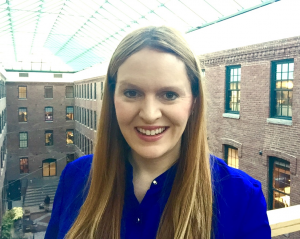
VP of International Operations and Strategy
Hubspot
Nataly Kelly and I worked together at Language Line close to 20 years ago. She went on to become a language consultant, an author and a marketer. When our paths recently crossed again, she is now an employer who is very interested in hiring graduates from the MIIS TILM program. She is the VP of International Operations and Strategy at HubSpot, a company recognized by Inc., Forbes, and Deloitte as one of the world’s fastest-growing companies. HubSpot was also voted as the #1 company to work for in Boston by the Boston Globe, Boston Business Journal, and the #4 company to work for in the United States according to Bloomberg. I sat down with her recently to interview her because she is someone who can impart great wisdom for our students and graduates.
WH: Nataly, you were a Fulbright Scholar in Sociolinguistics. Tell me how you ended up in a leadership position in one of the world’s fastest growing companies? What role has your language skills played, if any?
NK: The common thread in my career has been an interest in communication, and overcoming communication barriers. My first job out of college was at Language Line, but I left to pursue a Fulbright grant in Ecuador. When I returned from Ecuador, I co-founded my own business to do research and consulting within the translation industry. From there, I went to work at another translation company, where I developed new services and products, such as language testing and cultural competence training. After that, I joined translation industry research firm Common Sense Advisory, first as an analyst, then as their Chief Research Officer. Later, I moved to a translation technology start-up working in market development, developing a partner channel with translation agencies. That was my first foray into the world of B2B software-as-a-service (SaaS), which is a space I really love. Having dabbled in marketing in most of my prior jobs, I became their VP of Marketing, for which clear communication is an absolute must. And from there, I moved to HubSpot, also as a VP of Marketing. Initially, I led the Latin American Marketing group at HubSpot while also building out a localization program within marketing team. Recently, I moved into another exciting role here at HubSpot, and now I focus on international operations and strategy.
The role my language skills have played has been tremendous. I can’t imagine doing any of the jobs I’ve had without them. Granted, I haven’t needed interpreting and translation skills for each and every job, but those skills definitely enhanced my ability to carry out my work and to speak credibly to language issues. For example, at Common Sense Advisory, I was able to provide the viewpoint of a translator to ensure this perspective was reflected in the research. And in my current role, where HubSpot is a buyer of localization and translation services, I’m able to provide the perspective of the translator to ensure that we are the best possible client we can be, and that we make life enjoyable for the freelancers who work with us through our agencies.
WH: You are no stranger to the TILM programs at MIIS. What are the job titles that you see our students take up?
NK: There are so many important job opportunities available for graduates of the TILM programs at MIIS! The language services market is enormous, worth billions of dollars per year. There are many exciting (and well-paying) jobs within that industry, both on the suppliers side with translation and interpreting agencies, as well as on the buyer side, at companies like HubSpot, Google, Facebook, Twitter, LinkedIn, and so many more.
Here at HubSpot, we have roles in every single department that support our international business. On our support team, for example, several of our team members are in charge of our international support sites. On the marketing team, we now have a full-time person in Dublin who manages localized campaigns in multiple languages, and we have many international marketers who work with the localization team. On the localization side, we have a full-time person in charge of our software internationalization, and many of our engineers are involved in this work as well. And today, we have a localization manager, Chris Englund, who works with me, and we’re hiring for three full-time localization specialists out of our Cambridge, Dublin, and forthcoming Tokyo office set to open in 2016. This is just the very beginning for us in terms of international expansion. We have a long way to go from here!
WH: Something that will be of great interest to our students is what you look for when you hire? And what you look for when you hire language professionals specifically?

NK: HubSpot looks for some very specific things when we hire. This is outlined extensively in our Culture Code, which really encapsulates how we think, act, and work at HubSpot. I encourage everyone to check it out, even if you don’t plan to work at HubSpot, because to me, it outlines a lot of things that I believe every great employer should prioritize for a healthy and enjoyable work environment. We look for people who have a clear track record of growth, a bias for action over inaction, and importantly, humility. One thing you consistently notice about people at HubSpot is that they’re all very nice people. That is definitely not something you see at every company. So, we hire for cultural fit very intentionally here.
As for language professionals, we’re looking for individuals who will play somewhat of an “editor-in-chief” role for the languages in question. This person will own the brand voice and style and help us stay on track with that, but will also be an expert in translation and editing for their language. It’s also very important for this individual to be a digital native who loves learning new tools, including learning how to use HubSpot products. This person needs to have the “final say” on matters of language, but they also need to be very open to the fact that language evolves, so they need to be in touch with the latest terminology and techie speak that marketers are using – or they have to show a strong willingness and aptitude for learning this particular domain. It’s very important that this individual strike the right balance between prescriptivism and descriptivism where language is concerned. That is, they need to be able to come up with clear guidelines to ensure a consistent and clear voice for the brand in their language, but they also need to know when to be flexible and creative with language too.
WH: It seems that how translation/interpretation services are provided and consumed are changing rapidly. What role do you see language professionals play in the future economy and how can our graduates “future proof” themselves?
NK: I think graduates should pay attention to all of the many roles that are emerging for people with localization knowledge and skills, because there are so many great things happening right now. Today, roles like “community translation manager” and “localization director” are popping up in a lot of great tech companies. I would definitely encourage graduates to view their language skills as a gateway into international business, which extends far beyond just the translation and interpreting industry, which is very large in its own right. There are so many interesting career options out there, and language increasingly touches so many of them. Remember too that these are niche skills that are in high demand. Often, companies hire people who don’t have a background in these areas because they can’t find talent locally.
WH: If your favorite cousin were one of our students graduating in May 2016, what advice would you give her?
NK: Well, I can’t pick a favorite cousin since I love them all equally! (Laugh!) However, here are the two pieces of advice I would give to my daughter if she were lucky enough to graduate from one of your programs.
First, follow your passion, even if you’re not sure exactly where it will lead. Look for a job that will align with what you enjoy doing most, and if that includes language, consider positions that will enable you to work in international areas. On my first international flight, I explained that I was traveling to Ecuador to perfect my Spanish, and she told me that every language you learn is like another college degree. So of course I went and studied every language I could possibly get access to! I have always followed my passions for language and international business, and that is where I am truly at home, especially in the world of B2B SaaS.
Second, choose your employers and coworkers very carefully. It might sound severe, but I really mean it. Work only with teams of people you truly admire, from whom you can learn a lot, and to whom you can also contribute something meaningful. Find a place that offers you a lot of room to grow. Look for managers who not only take pride in helping employees move forward in their careers, but who realize that this is actually a huge part of their job to ensure employee retention and overall growth of the company. Most importantly, work only in places with a mission you can truly identify with. At HubSpot, I’m having the most fun I’ve ever had in any job, because I work with extremely talented people who also happen to be very kind, every single day, and I learn at least as much from others as I contribute. Surrounding yourself with great people is a recipe for success in business as well as for personal happiness. As simple as it sounds, it’s perhaps the most important career advice I can give!
–Winnie Heh
Career & Academic Advisor
wheh@miis.edu


Wonderful and insightful interview! Great advice for localization/translation graduates and to industry veterans validation of our passion! Thanks Nataly Kelly and Yung-Chung Heh.